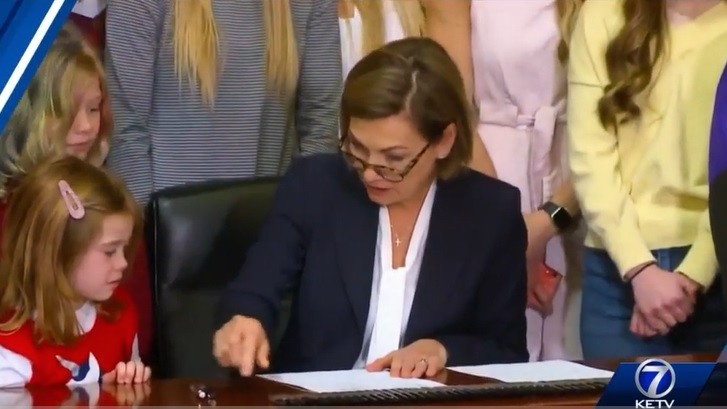Transgender Girls Are Now Banned From Girls Sports In Iowa
Iowa Governor Kim Reynolds signed a controversial bill into legislation regarding transgender sports.

Last Thursday, lawmakers in Iowa sent a bill to the desk of Governor Kim Reynolds banning women from competing in transgender sports. After the bill swept the House and Senate only with the support of Republican members, Reynolds signed the bill into law during a ceremony in the Capitol. The law goes into effect immediately and has caused more division in Iowa and the rest of the nation.
The controversial law marks Iowa as the 11th state in the nation to enact similar legislation regarding transgender sports. In Iowa, the piece of legislation will cover both high school and collegiate levels of sports, and it will require the schools to designate sporting events to strictly follow gender rules separating them in male, female, or co-ed categories. Furthermore, to enforce the new policy, the law states that only students who were marked female on their birth certificates will be eligible to play female sports.
Republicans have shown stout support for similar bills banning transgender girl sports. The opposition comes from a belief that keeping transgender women out of sports supports a fair balance without taking away athletic opportunities from cisgender women. While signing the bill into law, Governor Reynolds said, “This is a victory for girls’ sports in Iowa. No amount of talent, training or effort can make up for the natural physical advantages males have over females. It’s simply a reality of human biology. Forcing females to compete against males is the opposite of inclusivity and it’s absolutely unfair.”
Ainsley Erzen, a Senior athlete at Carlisle High School was one of the Iowa cisgender females who voiced support for the new legislation regarding transgender sports. In an open letter to the Iowa Girls High School Athletic Union shared with Des Moines Register, Erzen stated the bill would protect female athletes. “Iowa girls today and every generation to come will be able to pursue the things they love to the best of their abilities,” Erzen said. “Whether that’s chasing titles, records, scholarships or earning a starting position on a team. No girl will be sidelined in their own sport.”
On the other spectrum, many Democrats strongly oppose the new law that went into effect immediately. Generally, liberals believe such bills only do harm while sending a discriminatory message to all transgender sports athletes. After all, where do such people get to compete? Several schools throughout Iowa have already shown dissent from the new law. Iowa City Community School District released a message last week stating the school’s official opposition to the new law. Iterating that the school wants to make it “clear” that they support both transgender students and all student-athletes. Similarly, the Cedar Rapids Community School District shared transgender sports support with a message saying the district does not support any anti-LGBTQ+ laws.
Other school districts and transgender sports supporters expressed confusion on how the bill will affect the classrooms. A representative from Des Moines Public Schools stated the legislation remains unclear as to how schools are expected to implement the new law. Similarly, many believe the legislation discriminates against transgenders, leading to concerns of conflicts with anti-discrimination federal laws.
Iowa’s new transgender sports ban follows 10 other states across the nation that have recently enacted similar laws. South Dakota Governor Kristi Noem signed a similar ban in February. Similarly, Alabama, Arkansas, Florida, Mississippi, Montana, Tennessee, and Texas all passed transgender sports banning legislation last year. In accordance with Federal law, several court cases have taken the legislation’s legality into the courtroom. A judge in West Virginia issued an order allowing an 11-year old transgender girl to participate in girls’ cross country after she sued the state. And until state governments get a further grasp on such laws, the court cases will likely continue.



